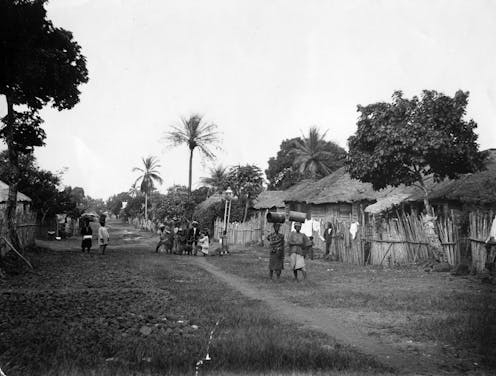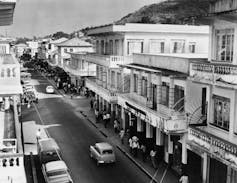
Freetown, the capital of Sierra Leone on the west African coast, was named for the freed slaves who were returned to Africa by British members of the movement to end slavery. Founded in 1787 by a group of 400 black Britons from London, the colony ultimately became a refuge for nearly 100,000 people resettled by the British Anti-Slavery Naval Squadron.
As a historian focusing on the impact of abolitionism, I have studied this history and the founding of modern Sierra Leone.
There is a misconception that Britain was the first to abolish the slave trade. It wasn’t the first, but its decision to abolish the trade was backed up by the power of its navy. Sierra Leone’s role in the story shows, however, to enforce that abolition, the British navy had to rely on the support of African states and polities that had already turned against the slave trade.
Africans played an overlooked role in ending the transatlantic slave trade. Sierra Leone’s rich history is testament to that.
The founding of Sierra Leone
The Atlantic Slave Trade began around the 1520s, but the area around Sierra Leone was not a major contributor to the trade before the middle of the 1700s. From 1763 onwards, the number of enslaved people shipped annually from the Sierra Leone coast by British, Portuguese and French traders rarely fell below 1,000 and was often closer to 4,000. Even then, the number of captives was roughly half the number being transported from the Gold Coast (Ghana), a quarter of the number being transported from the Bight of Benin, and a tenth of the number transported from the Angolan coast.
And yet from 1808, it was Sierra Leone – rather than one of the other sites of slave trading – that became the site of British anti-slavery operations. This was because by then, Sierra Leone was the site of an established and growing colony made up of members of the black British diaspora, many formerly enslaved. And the success of that colony was possible in part because of the interest and engagement of the Temne, the Susu, and other African people based in and around the Sierra Leone peninsula.
In 1787, the first group of black Britons arrived on the peninsula as part of a project in self-government and with the support of the London-based abolitionist leaders Granville Sharp and Olaudah Equiano. The first settlement faced hardships and lacked support among the Temne, whose land they were renting.
The settlement grows
In 1791, another group arrived in the colony and sought out a new treaty of settlement. This group chose to immigrate to Sierra Leone from inhospitable Nova Scotia (Canada), where they had been settled by the British government as “black loyalists” after fleeing from slavery during the American Revolution (1776-1783). A new organisation, the Sierra Leone Company, took over the management of the colony from London. Their records show that by the early 1790s, the Temne saw the arrival of these colonists as an opportunity.
King Naimbana, for instance, who negotiated the treaty between the Sierra Leone Company and the Temne, sent his son to London for education. And in their negotiations, company officials noted that the people they were engaging with were keen for opportunities to trade for imported goods without reverting to selling other people.
African role in ending slavery
As I found in my research, it was African demand that was shaping the success of the colony and its mission to shift the coast’s commerce away from the slave trade. Records held at the Huntington Library in California show that local buyers paid a higher price for the “SLC” mark – a price paid in goods and currency, rather than in enslaved captives. One British representative wrote a letter in 1793 to the Sierra Leone Company to complain that “it has become practice with slave traders to bring out guns for trade marked SLC for which they get a rapid sale and a double price in the Rio Nunez” to the north of the colony. He also worried that this was happening with “SLC” cloths.
Although he was unsure of their enthusiasm for the abolition of the slave trade, the British official commented that “their mouths were full of proposals to trade with us and plant cotton and coffee”. And a Susu leader’s deputy launched a verbal attack against the slave traders, telling them:
It is you slave traders who cause all our palavers. It is you who set the people in this country one against another. And what do you bring us for this? We have cloth of our own if you were gone tomorrow we should not be naked. If you were gone we should want but little guns and powder.
This support of the Susu and Temne around Sierra Leone for the colony, its trade, and its African diaspora population meant that the colony seemed like a natural fit for the British when they were looking for a way of enforcing their Slave Trade Act in 1807 to end the Atlantic slave trade. The British based an anti-slave trade naval patrol in the colony, as well as a court for processing captured slave ships.
The Sierra Leone Company was happy to hand over control to the British government, but it was the people on the ground whose successful trading relationships had built a growing city with markets, accommodation, infrastructure and, most importantly, a sense of security for the thousands of resettled enslaved people who would soon see its population soar.

Conclusion
There is a misconception that Britain was the first to abolish the slave trade and that it brought enlightened anti-slavery ideas to Africa. This misconception was used to justify the spread of colonial rule in the 19th century. But the history of Sierra Leone shows that, in order to enforce their abolition decrees, the British had to rely on African states and polities that had already turned against the slave trade.
Bronwen Everill received funding from the Leverhulme Trust and the Huntington Library for this research.
This article was originally published on The Conversation. Read the original article.







